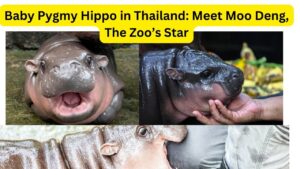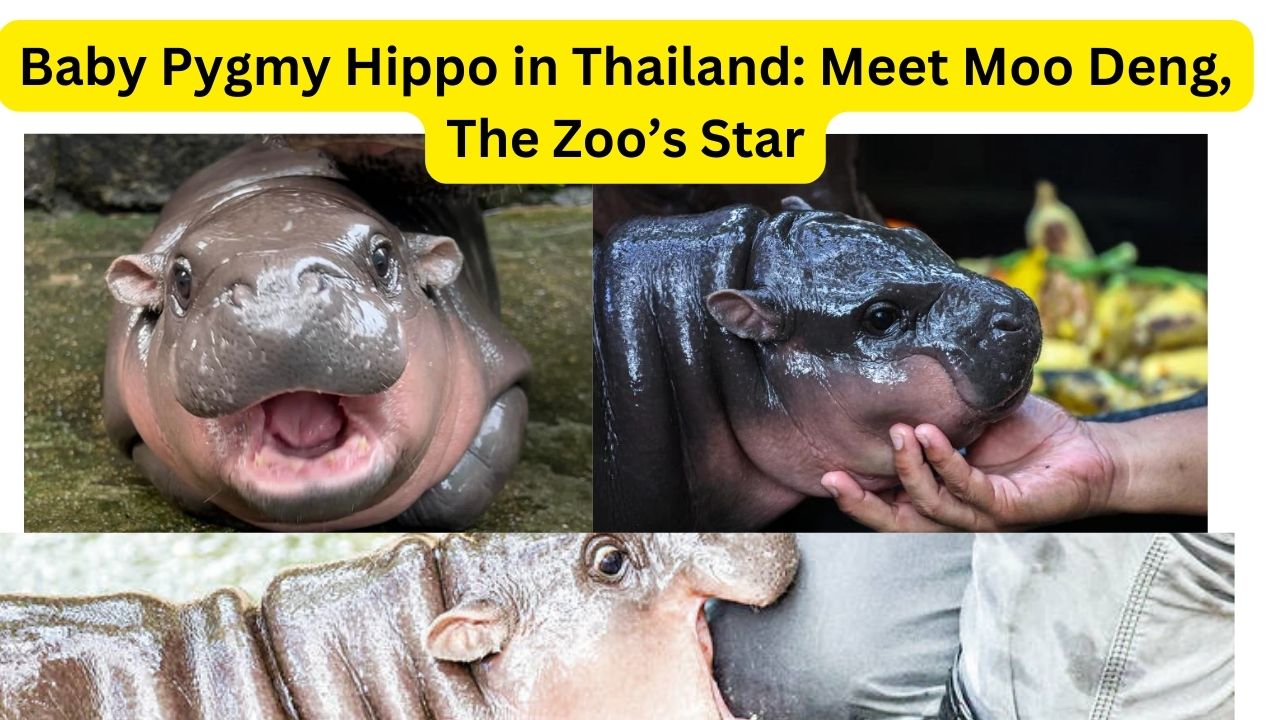In the lush landscapes of Thailand, a tiny, charismatic animal has captured the hearts of locals and tourists alike. Moo Deng, a baby pygmy hippo, has risen to celebrity status at a Thai zoo, where visitors flock to catch a glimpse of this adorable creature. Moo Deng isn’t just a cute face; his presence is raising awareness about the plight of endangered species, particularly the vulnerable status of pygmy hippos in the wild.
The story of Moo Deng and the zoo’s concerns over his well-being offers a heartwarming and educational look into the conservation efforts surrounding pygmy hippos and the challenges of protecting endangered animals.
Who is Moo Deng, Thailand’s Baby Pygmy Hippo?
Moo Deng, born at a zoo in Thailand, quickly became a beloved figure, drawing attention not only from zoo-goers but also from the media. His curious nature, playful antics, and endearing appearance make him a favorite among visitors. Pygmy hippos are much smaller than their more common cousins, the common hippopotamus, making them unique and even more intriguing to watch.
The birth of Moo Deng was a significant event for the zoo, as pygmy hippos are classified as vulnerable on the IUCN Red List of Threatened Species. The species is native to the forests and swamps of West Africa, and it is estimated that fewer than 3,000 remain in the wild, mainly due to habitat loss and poaching.

Moo Deng’s Journey to Fame
Since his birth, Moo Deng has become a media sensation in Thailand. His daily activities are closely followed, with many taking to social media to share videos and photos of the baby hippo. His rise to fame is not just about his cute looks but also about highlighting the importance of wildlife conservation.
Moo Deng’s popularity has allowed the zoo to bring more attention to the pygmy hippo species, which remains one of the most threatened mammals in the world. Educational programs are being introduced to teach visitors about the dangers pygmy hippos face and what can be done to help protect them from extinction.
What Makes Pygmy Hippos Special?
Unlike the larger common hippopotamus, pygmy hippos are much smaller and more solitary. Native to the dense forests of West Africa, they are elusive in the wild, often spending most of their time submerged in water or hidden in thick vegetation. These characteristics make them hard to study, which adds to the challenges of conservation.
Pygmy hippos are also different in their behavior. They are generally shy and prefer to avoid confrontation, which contrasts with the often aggressive nature of their larger counterparts. Their diet consists mainly of fruits, leaves, and roots, and they are nocturnal, meaning they are most active at night.
Conservation Efforts for Pygmy Hippos
Moo Deng’s presence at the Thai zoo is not just a source of entertainment; it serves a much larger purpose. With fewer than 3,000 pygmy hippos left in the wild, conservation efforts are crucial. Zoos and wildlife reserves around the world, including the one where Moo Deng resides, are working tirelessly to ensure the survival of the species.
Key Threats to Pygmy Hippos in the Wild
- Habitat Loss: As human populations expand, forests and wetlands—the natural habitat of pygmy hippos—are being destroyed for agriculture, logging, and urban development.
- Poaching: Although pygmy hippos are not as heavily targeted by hunters as larger species, they are still vulnerable to poaching for their meat and other body parts.
- Climate Change: Changes in weather patterns and increased flooding pose additional risks to the remaining populations of pygmy hippos in their natural habitats.
Conservationists are focused on protecting these remaining wild populations by preserving their habitats and educating local communities about the importance of protecting wildlife. Zoos, like the one where Moo Deng resides, also play a critical role by providing a safe environment for breeding and by raising awareness globally.
Challenges of Raising a Pygmy Hippo in Captivity
While Moo Deng has captured the hearts of many, his caregivers at the zoo have expressed concerns about the challenges of raising a baby pygmy hippo in captivity. Pygmy hippos, while adorable, require specialized care to thrive. Their water needs, diet, and social behavior must be closely monitored.
The zoo has made public statements regarding their concerns for Moo Deng’s well-being, particularly in ensuring that his environment mimics his natural habitat as closely as possible. This includes providing ample water sources, plenty of shade, and a diet rich in fruits and vegetables to mimic the diet he would have in the wild.
Despite these challenges, Moo Deng appears to be thriving, and his caretakers are dedicated to ensuring that he continues to live a healthy and fulfilling life.
Moo Deng’s Impact on Pygmy Hippo Conservation
The birth of Moo Deng has had a ripple effect on how people perceive the importance of endangered species. His celebrity status has led to increased public interest in not only pygmy hippos but also other endangered animals. Through Moo Deng, the zoo hopes to continue its work in educating the public about conservation efforts.
The attention brought to Moo Deng could potentially lead to more funding and support for wildlife conservation projects, both in Thailand and internationally. His story is a reminder of the delicate balance between human progress and the natural world, and the responsibility we all share in preserving endangered species.
Discover the incredible story of Moo Deng, the baby pygmy hippo born in Thailand that has become a celebrity, captivating zoo visitors and raising awareness for endangered species.
Baby Pygmy Hippo in Thailand: The Fascinating Story of Moo Deng’s Rise to Fame
While Moo Deng continues to captivate the public with his charm, his story also serves as a crucial reminder of the importance of wildlife conservation. The efforts surrounding his care, the awareness he has raised, and the global interest in the plight of endangered species like the pygmy hippo emphasize the collective responsibility we all have in protecting the environment.
The Role of Zoos in Conservation
Moo Deng’s rise to fame is an excellent example of how zoos can play a vital role in wildlife conservation. Zoos are often seen as centers of education and research, where endangered species are not only bred and cared for but also studied to better understand their needs.
Key Functions of Zoos in Conservation:
- Breeding Programs: Many zoos participate in captive breeding programs to increase the population of endangered species. This helps maintain genetic diversity and can even contribute to reintroduction efforts into the wild.
- Public Education: Zoos provide a unique platform to educate the public about endangered species and the need for conservation. Programs that include interactions with animals like Moo Deng help foster a sense of responsibility in protecting these species.
- Funding and Support: Celebrity animals like Moo Deng can help zoos raise funds for global conservation efforts. Increased visibility often leads to more donations and support for protecting animals in the wild.
By focusing on conservation, zoos like Moo Deng’s home are working towards creating a sustainable future for pygmy hippos and other endangered animals. The attention that Moo Deng has received is a step in the right direction for improving conservation efforts globally.
The Future for Moo Deng and Pygmy Hippos
As Moo Deng grows, his impact will likely continue to expand, drawing attention to the pygmy hippo species and their ongoing battle for survival in the wild. The zoo in Thailand remains committed to his care, ensuring that he lives in a safe environment while also contributing to greater conservation efforts.
In the future, conservationists hope that more attention will be given to preserving natural habitats, fighting poaching, and increasing breeding programs to help protect pygmy hippos from extinction. Every individual animal, like Moo Deng, represents hope for the survival of an entire species.
What You Can Do to Help Pygmy Hippos
There are many ways you can help support the conservation of pygmy hippos and other endangered species:
- Support Conservation Organizations: Donate to wildlife conservation groups that work to protect animals like pygmy hippos in the wild.
- Educate Others: Share information about endangered species with your friends and family to help raise awareness.
- Visit Responsible Zoos: Support zoos that focus on conservation and education, like the one where Moo Deng resides.
- Advocate for Change: Encourage your government and local leaders to enact policies that protect wildlife and their habitats.
Moo Deng’s Legacy
Moo Deng’s story is more than just a tale of a cute baby animal—it’s a powerful reminder of the fragile balance between humans and nature. His presence at the zoo in Thailand is a beacon of hope for pygmy hippo conservation, inspiring people to take action in the fight to save endangered species.
As he continues to grow and thrive, Moo Deng will undoubtedly leave a lasting legacy in the world of conservation, serving as a symbol of the ongoing efforts to protect vulnerable species like the pygmy hippo for generations to come.
My Points
Moo Deng, the baby pygmy hippo, has done more than just entertain visitors at his zoo in Thailand—he has become a symbol of conservation efforts for endangered species around the world. His rise to fame underscores the importance of protecting vulnerable animals and ensuring that they continue to have a place in our world.
